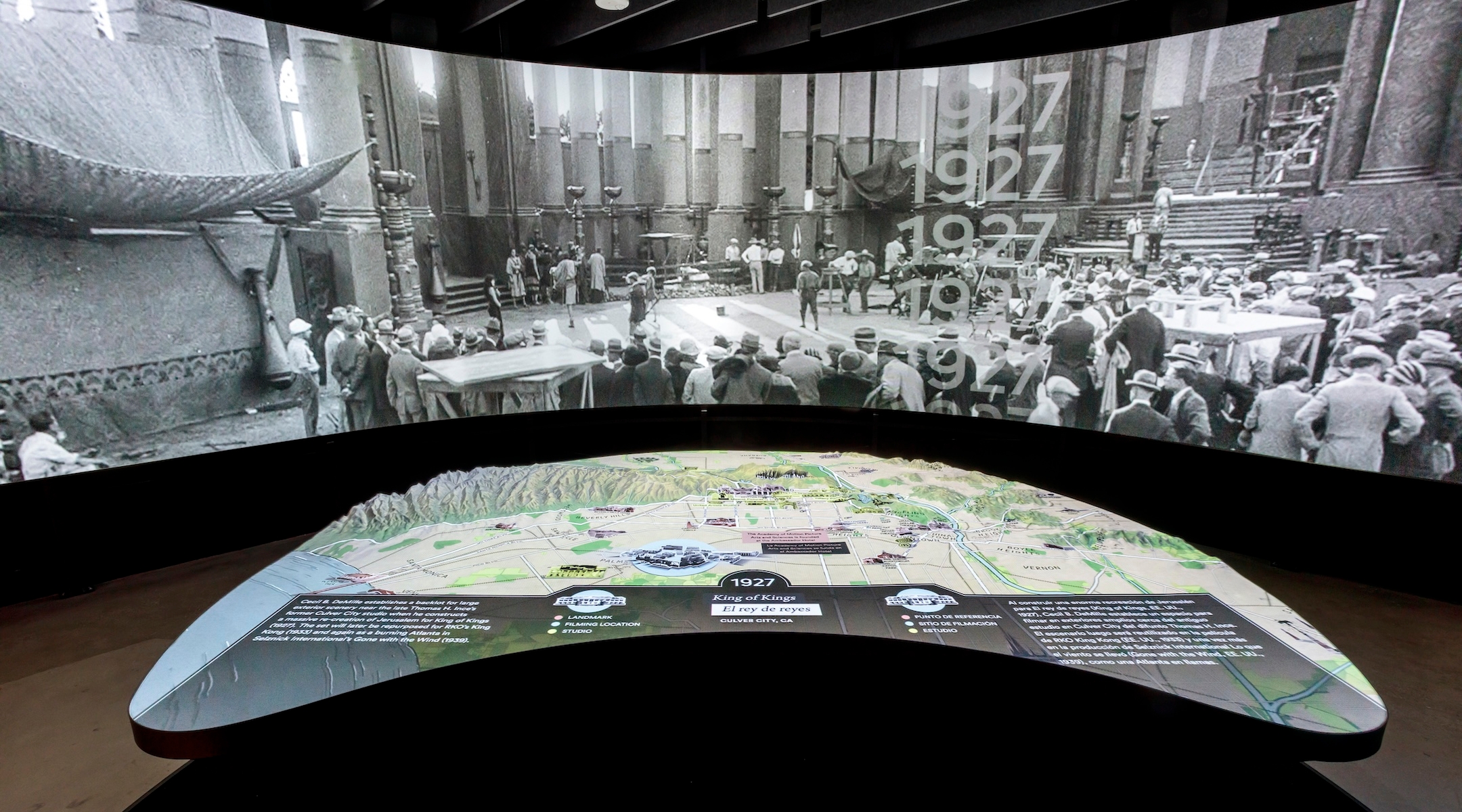LA’s Academy Museum to revise exhibit on Jewish founders after criticism from Jewish Hollywood figures
An open letter from Jewish Hollywood workers accused the museum of trafficking in antisemitism in its new exhibit on the industry’s Jewish founders

A view of the topographical map inside the “Hollywoodland” exhibit. (Josh White, JWPictures/Academy Museum Foundation)
An exhibit about Jews in Hollywood that launched at the Academy Museum of Motion Pictures in Los Angeles following an outcry from Jewish critics is now getting a revision — following another outcry from Jewish critics.
The museum opened its first-ever permanent exhibit, a deep-dive on the Jewish pioneers that laid the groundwork for Hollywood, on May 19. “Hollywoodland: Jewish Founders and the Making of a Movie Capital” launched two and a half years after the museum opened without the history of the industry’s Jewish beginnings.
Designed as a response to critics who complained about Jewish exclusion from the museum, the exhibit highlights the Warner brothers, Louis B. Mayer, Adolph Zukor and other Jewish film giants. And now, it has drawn fire for portraying some of those figures in a negative light.
“We wish to express our extreme disappointment in, and frustration with, The Academy Museum’s Jewish Founders exhibit,” said an open letter signed by more than 300 industry professionals. “Using the words ‘tyrant,’ ‘oppressive,’ ‘womanizer,’ ‘predator,’ ‘offensive,’ ‘racial oppression,’ ‘nepotism,’ and ‘prejudices,’ it is the only section of the museum that vilifies those it purports to celebrate.”
The statement acknowledges “the value in confronting Hollywood’s problematic past,” but goes on to accuse the museum of creating a “despicable double standard.”
“Blaming only the Jews for that problematic past, is unacceptable and, whether intentional or not, antisemitic,’ the letter says, before calling on the museum to “thoroughly redo this exhibit.”
The letter was organized by United Jewish Writers, a coalition that formed shortly after Hamas’ Oct. 7 attack on Israel as the Hollywood unions were divided over whether and how to issue statements condemning the attack and supporting Israel. The group previously organized an open letter rebutting “The Zone of Interest” director Jonathan Glazer’s Oscars speech that criticized Israel.
The new letter asked signatories not to post publicly on social media and does not display who signed. But according to The New York Times, signatories include executive Casey Wasserman, actor David Schwimmer and writer Amy Sherman-Palladino.
“This is not unconscious bias, this is conscious bias,” producer Lawrence Bender, who signed the letter, told the Times. “It feels like a hatchet job on the Jews.”
The letter followed mounting criticism — covered by local outlets TheWrap and Los Angeles Magazine — since the exhibit’s launch, including from Israeli-American director Alma Ha’rel, who resigned from the museum’s inclusivity committee after touring.
On Monday, the museum announced that it was making changes in response to the feedback.
“We have heard the concerns from members of the Jewish community regarding some components of our exhibition,” said the statement, released before the United Jewish Writers letter arrived. “We take these concerns seriously and are committed to making changes to the exhibition to address them.”
A first set of unspecified changes would be made “immediately,” the statement said, adding that the changes “will allow us to tell these important stories without using phrasing that may unintentionally reinforce stereotypes.”
The museum also said it would convene an advisory group composed of “experts from leading museums focused on the Jewish community, civil rights, and the history of other marginalized groups to advise us on complex questions about context and any necessary additions to the exhibition’s narrative.”
Ahead of the opening of the “Hollywoodland” exhibit, Jacqueline Stewart who until last month served as the museum’s director and president, had told the Jewish Telegraphic Agency that community feedback played a role in the construction of the exhibit. (Her departure was planned prior to the exhibit’s opening.)
“I really feel that we’re able to present this exhibition now in a way that’s better than it would have been if we had tried to tell the story when we first opened,” Stewart said during a press preview. “Because we understand our audiences better.”
The new exhibit initially drew plaudits, including from some who had previously criticized it for excluding Jewish stories. But the new critiques, made at a time of extreme anxiety about Jewish inclusion, started soon after.
“The exhibit is a lazy and insidious condemnation of Hollywood’s founders,” writer Patrick Moss told LA Magazine. “The focus is not on the founder’s achievements — but on their sins.”
This article originally appeared on JTA.org.
A message from our CEO & publisher Rachel Fishman Feddersen
I hope you appreciated this article. Before you go, I’d like to ask you to please support the Forward’s award-winning, nonprofit journalism during this critical time.
We’ve set a goal to raise $260,000 by December 31. That’s an ambitious goal, but one that will give us the resources we need to invest in the high quality news, opinion, analysis and cultural coverage that isn’t available anywhere else.
If you feel inspired to make an impact, now is the time to give something back. Join us as a member at your most generous level.
— Rachel Fishman Feddersen, Publisher and CEO